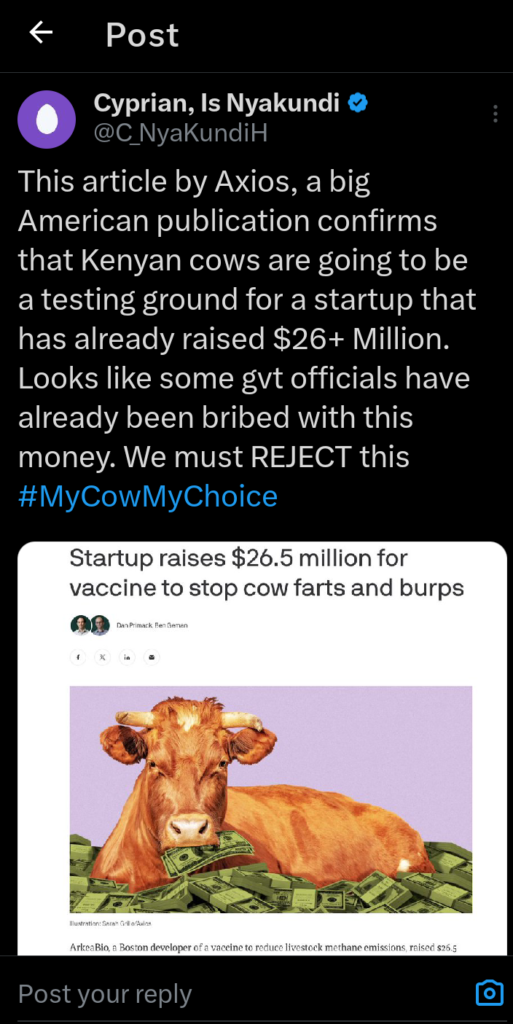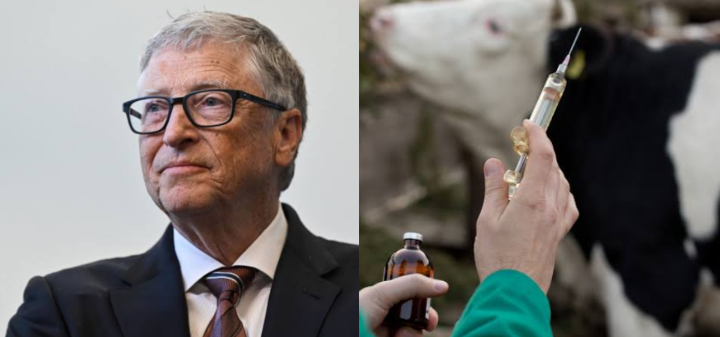This vaccine, designed to target methane-producing microorganisms in cows, has already attracted over $26 million in funding.
While it is branded as a solution to reduce agricultural greenhouse gas emissions, the project raises serious ethical, governance, and health concerns.

President William Ruto’s administration and the Ministry of Agriculture, led by Cabinet Secretary Dr Andrew Karanja, are under fire for allegedly allowing Kenya to be used as a testing ground for unproven biotechnology.
Critics argue that the government’s willingness to approve such trials without widespread consultation is evidence of compromised leadership.
Activists and farmers have claimed that bribes may have influenced this decision, pointing to the large sums of money invested in the project.
The secrecy surrounding the trials, as well as the lack of farmer involvement in decision-making, has only fueled public suspicion.
Kenyan farmers, many of whom rely on livestock for their livelihoods, have expressed outrage at the potential risks associated with the vaccine.
Questions remain about its safety, possible side effects on cows, and long-term effects on the agricultural ecosystem.

Farmers fear that their animals could become experimental tools, with little regard for their welfare or the consequences for food security.
The campaign #MyCowMyChoice has emerged as a defiant response to these plans, calling for the protection of local agricultural interests from foreign interference disguised as climate solutions.
The global context of this controversy also raises red flags.
Developing countries like Kenya are often targeted for trials of new technologies that would face greater scrutiny in developed nations.
This pattern suggests an exploitative situation, where the promise of climate benefits is used to push untested projects on vulnerable populations.
The fact that this initiative aligns with broader international climate goals, while disregarding local realities, has not gone unnoticed.Critics have also highlighted inconsistencies in President Ruto’s policies.
While his administration touts agricultural reforms and climate resilience, these developments reveal a troubling lack of alignment with farmer interests.
Many are questioning why the government is prioritizing foreign-backed experiments over addressing urgent local challenges like drought, poor infrastructure, and market instability.
Ruto’s promises to empower farmers ring hollow in the face of decisions that seem more geared toward serving corporate and foreign interests.
The involvement of powerful individuals and organizations in promoting the vaccine adds another layer of concern.
With Bill Gates and other influential players pushing for rapid implementation, Kenyan officials must tread carefully.
Transparency, rigorous testing, and public consultation are essential, but the current approach suggests a disregard for these principles.
This project threatens to deepen public mistrust in the government and raise doubts about its ability to safeguard national interests.
The backlash against this initiative highlights a broader struggle to protect Kenya’s agricultural heritage from exploitative schemes.
As pressure mounts on Ruto’s administration to justify its actions, Kenyans are demanding accountability and rejecting any attempt to use their livestock as experimental subjects.
Safeguarding farmers’ rights and ensuring responsible governance are critical in preventing this project from becoming another example of foreign exploitation under the guise of development.





















Add Comment